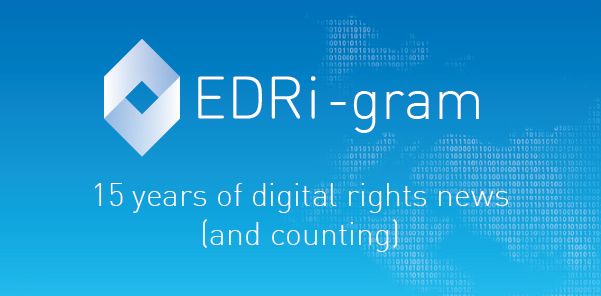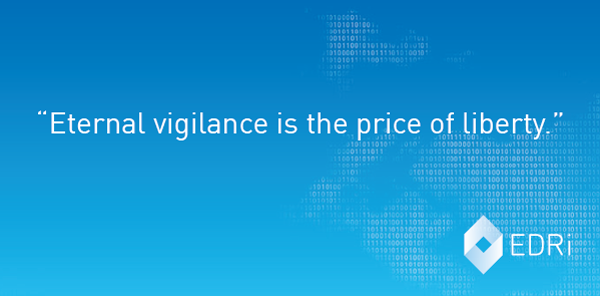EDRi-gram – 15 years of digital rights news (and counting)
15 years ago this day, on 29 January 2003, we published our very first EDRi-gram. To celebrate this occasion, we are looking back at the articles in this first newsletter.

If you are feeling nostalgic, you can read the original EDRi-gram Number 1 here:
http://history.edri.org/edrigram/number1
A lot has changed, a lot stays the same.
Copyright Directive
Implementing the European Copyright Directive
(Click the link to read the original article)
In 2003, we had just escaped one of the biggest threats to the internet in Europe, the so-called “web caching ban”. Copyright fundamentalists tried to ban the incidental copies made by networks, unless they were separately authorised.
In 2018, we are facing one of the biggest threats to the internet in Europe. Copyright fundamentalists are trying to force everything uploaded to the internet to be subject to prior authorisation and/or upload filtering by internet hosting services.
Data retention
Rally Members European Parliament against data retention
(Click the link to read the original article)
In 2003, we were at the start of a long campaign by certain EU Member States to impose mandatory data retention, using the proposed ePrivacy Directive as a tool to achieve this goal.
In 2018, and despite two European Court rulings rejecting mandatory data retention, we are faced with a campaign from certain EU Member States to impose mandatory data retention, using the proposed ePrivacy Regulation as a tool to achieve this goal.
Software patents
New patent law on software threatens innovation
(Click the link to read the original article)
In 2003, European activists were faced by a massive, lobby-driven, well-financed attempt to impose software patents in Europe. The proposal was ultimately rejected, in one of the most unlikely of all “David and Goliath” successes of European activists.
Entitlement cards
Update: United Kingdom
(Click the link to read the original article)
In 2003, the UK government was trying to impose national ID cards through the back door via a national public service “entitlement” card.
In 2018, the Irish government is trying to impose national ID cards via a (“mandatory but not obligatory”) national public service entitlement card.
German censorship
Action against governmental censorship in Germany
(Click the link to read the original article)
In 2003, the German authorities were pushing censorship through the demonstrably ineffective use of blocking by internet access providers.
In 2018, the German authorities are pushing censorship through the coercion of internet services to delete content more quickly.
Recommended reading
“The Human Rights Network in Moscow has just released a very useful online report about online privacy in Russia. According to the introduction fundamental human rights and freedoms – freedom of speech, freedom of information, privacy – are apparently unprotected on the Net. While Russian Internet is growing these rights and freedoms suffer from frequent and widespread invasion.”
In 2003, our recommended reading was a study about online restrictions in Russia:
https://web.archive.org/web/20030506121238/http://www.hro.org:80/docs/reps/privacy/2002/eng/index.htm
In 2018, the story continues:
https://www.hrw.org/news/2017/08/01/russia-new-legislation-attacks-internet-anonymity

Oh no! Did you miss the 363 previous editions of the EDRi-gram? No worries, you can read all of them here and here.
And it’s of course never too late to subscribe to our newsletter!

